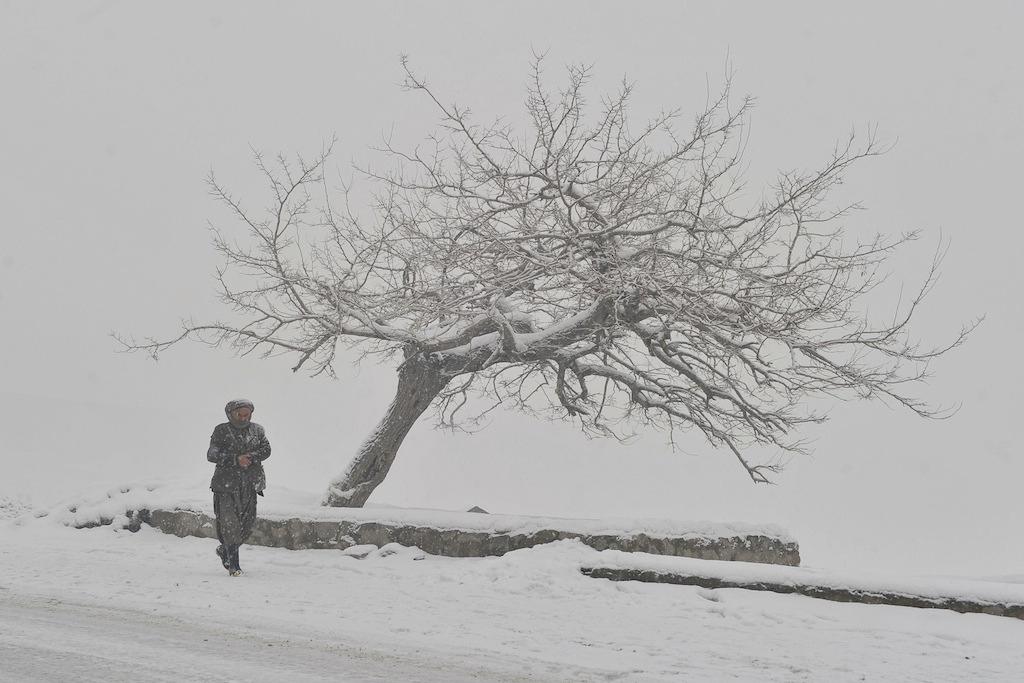Afghanistan: It’s worse in the winter
An Afghan man walks as snow falls in Kabul.
KABUL, Afghanistan — Mohammad Baqir left northern Afghanistan a year ago, seeking work away from his local mining community. Today he sells coal next to a busy Kabul street that has turned to mud in the rain, ice and snow.
Every winter the infrastructure of this rapidly expanding city struggles under the weight of the severe weather. There are regular power cuts, roofs collapse and children are at risk of dying from the cold.
Although life has improved for many people since the 2001 invasion, hopes of a comprehensive US-led nation-building program have been replaced by the realization that this could be as good as conditions get in the capital and elsewhere.
"When we hear about the situation on the TV and radio the government is saying it doesn't have the budget to solve all these problems," said Baqir.
"The Turkish government promised several times that it would pave this road and the mayor is making an effort, but it's no use — they are just taking dust from one place to another."
Back in 2002, US President George W. Bush vowed to rebuild Afghanistan with a modern Marshall Plan — a program devised to help lift Europe from the ruins of World War II.
But as the temperatures in Kabul drop to well below freezing during the night and people struggle through another winter, the country seems no closer to lasting peace or long-term economic stability.
While much of capital has been transformed, it remains a city where even basic services are unavailable to residents.
Houses often have no running water or sanitation and there is a limited electricity supply. The gas generators businesses use during blackouts and the wood-burning stoves that heat homes only add to the thick pollution that hangs in the air.
People like Baqir settle here because life is even harder in rural areas. He earns the equivalent of roughly $200 a month, much of which he sends to his family in Samangan province.
Opposite his workplace is an Afghan military academy. Heroin addicts gather a short distance away and the river nearby is full of garbage.
More from GlobalPost: Ex-Taliban members are desperate for peace
Asked why conditions were still this tough in the capital, Baqir accused President Hamid Karzai of siphoning off money meant for reconstruction.
"He takes a piece for himself and then gives the rest to his vice presidents. His vice presidents take a piece and give the rest to the ministers and so on down," he said.
The sense that local officials and the international community have failed the poor was keenly felt last winter, when dozens of children living in Kabul's refugee camps died from the cold.
This time the United Nations was quick to announce it has been distributing food, blankets and warm clothing across the country.
The government has also tried to emphasize its role in these efforts. As well as sending supplies to rural communities, the Afghan National Disaster Management Authority offers compensation to people affected by avalanches, landslides and floods.
A single payment of about $1,000 is available to the family of anyone killed, with $200 to $400 awarded for the destruction or damage of property. The same fund is used to compensate the victims of war-related violence.
Decades of conflict and unrelenting poverty have, however, left a lot of people devoid of hope.
Reza Gul returned to Afghanistan from exile in Pakistan five years ago and is now living in a refugee camp of mud huts in the east of Kabul. Aged around 50 or 60 and a widow, she spends her days begging for money outside a local mosque.
Her son is disabled, having been injured as a child during the 1992-1996 civil war. “Our life is bitter,” she said. “Without God I have nothing.”
It is the combined strain of these social, economic and security pressures that is expected to place the country in such a precarious position when America and its allies pull out.
According to John F. Sopko, the United States' special inspector general for Afghanistan reconstruction, since 2002 Congress has provided nearly $90 billion to help with development and rebuilding.
How much of that has benefited those most in need is increasingly open to question as the 2014 withdrawal date approaches.
In a report published last October, Sopko warned that “the stakes are high, and time is of the essence.” Others are already resigned to the fact that it may already be too late.
Khan Jan Alokozai, a vice chairman at the Afghanistan Chamber of Commerce and Industries, told GlobalPost not enough has been done to ensure the country can progress in the longterm.
“Besides the war, in the last 10 years one problem that has risen up is the administrative corruption that all the commanders and government authorities have a hand in,” he said.
“When the international community is not here, like wolves they will eat the nation.”
More from GlobalPost: Afghanistan set for drone age
Every day, reporters and producers at The World are hard at work bringing you human-centered news from across the globe. But we can’t do it without you. We need your support to ensure we can continue this work for another year.
Make a gift today, and you’ll help us unlock a matching gift of $67,000!
